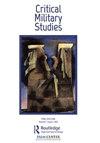Necropolitical branding: building communities of pre-emptive violence
Q1 Arts and Humanities
引用次数: 0
Abstract
ABSTRACT When we talk about the use of military force, the wars we fight, and the justifications we have for fighting them, we reproduce affective structures that inform the communities we build. Discursive practices surrounding the use of military force, like those identifying the protagonists and antagonists constructed by foreign policy, which deaths are deemed worthy of mourning, among others, reinforce frameworks that delineate the meaning of violence and its proper application. In the United States, these discourses typically weave through narratives of redemption that portray the use of military force as necessary, justified, and for the cause of good. In this paper, I argue that the pre-emptive use of military force advocated for in national security discourse is legitimized as acts of justifiable violence by being ‘on brand’ for necropolitical structures that ascribe a redemptive quality to any future uses of military force. Nuancing analyses of war legitimation discourse, this study is an interrogation of the ways in which a necropolitical branding markets the pre-emptive use of military force as a means of achieving peace and security. Ultimately, such an interrogation is an investigation into a source of influence and authority for security discourses to construct the future. Interrogating militarized violence as a consumer brand is valuable for critical analysis because it allows us to engage discourses that inform the communities we build, illuminating the ways in which such violence is reproduced and, in this way, facilitates understandings of how to disrupt and challenge its reproduction.死气沉沉的政治品牌:建立先发制人的暴力社区
本文章由计算机程序翻译,如有差异,请以英文原文为准。
求助全文
约1分钟内获得全文
求助全文
来源期刊

Critical Military Studies
Arts and Humanities-History
CiteScore
1.90
自引率
0.00%
发文量
20
期刊介绍:
Critical Military Studies provides a rigorous, innovative platform for interdisciplinary debate on the operation of military power. It encourages the interrogation and destabilization of often taken-for-granted categories related to the military, militarism and militarization. It especially welcomes original thinking on contradictions and tensions central to the ways in which military institutions and military power work, how such tensions are reproduced within different societies and geopolitical arenas, and within and beyond academic discourse. Contributions on experiences of militarization among groups and individuals, and in hitherto underexplored, perhaps even seemingly ‘non-military’ settings are also encouraged. All submitted manuscripts are subject to initial appraisal by the Editor, and, if found suitable for further consideration, to double-blind peer review by independent, anonymous expert referees. The Journal also includes a non-peer reviewed section, Encounters, showcasing multidisciplinary forms of critique such as film and photography, and engaging with policy debates and activism.
 求助内容:
求助内容: 应助结果提醒方式:
应助结果提醒方式:


